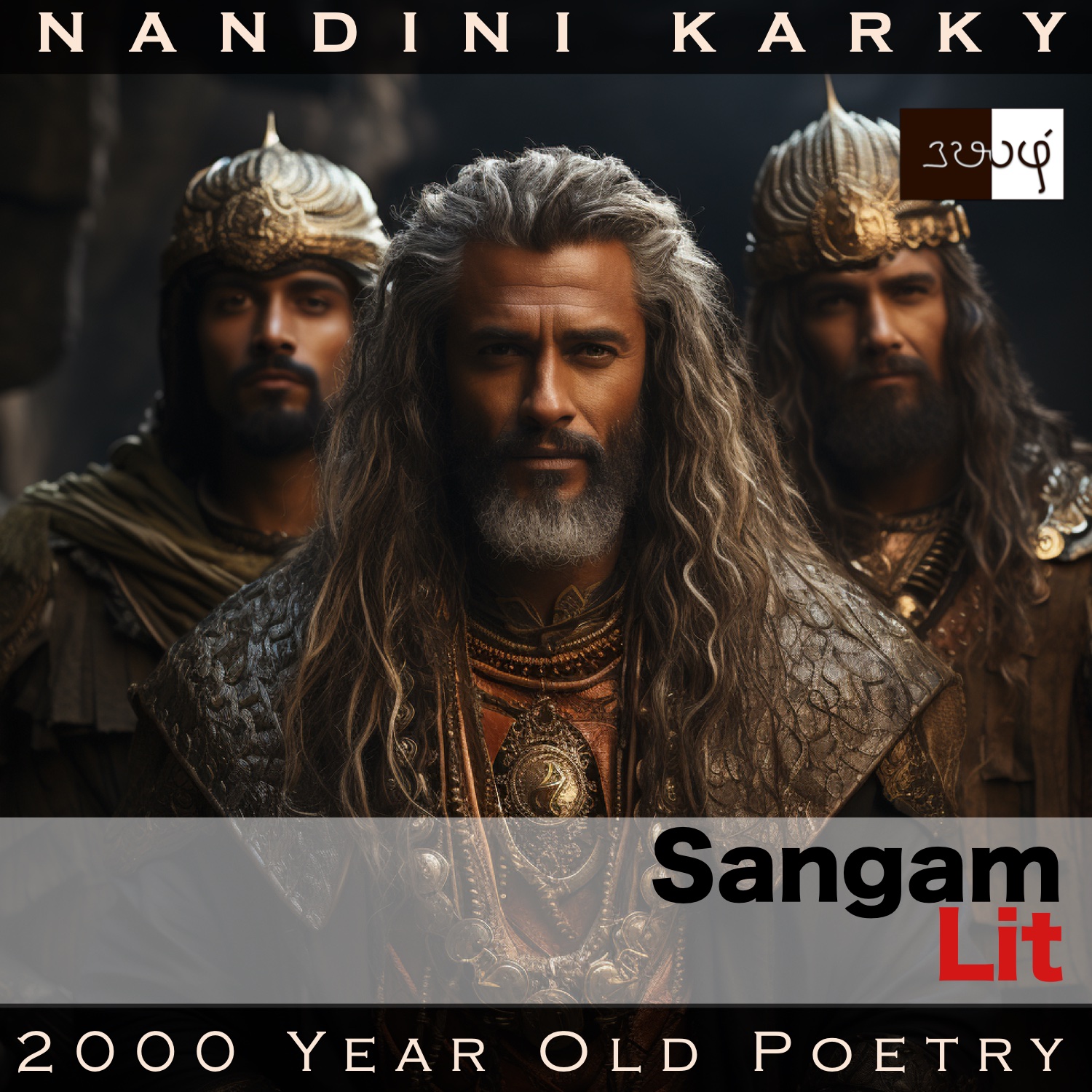Podcast: Play in new window | Download
Subscribe: Apple Podcasts | Spotify | Amazon Music | Android | iHeartRadio | TuneIn | RSS | More
In this episode, we hear about the wealth and power of a king, as depicted in Sangam Literary work, Puranaanooru 198, penned about the Pandya King Ilavanthikaippalli Thunjiya Nanmaaran by the poet Vadama Vannakkan Peri Saathanaar. Set in the category of ‘Paadaan Thinai’ or ‘Praise’, the verse reveals the regard the patron holds in the mind of this poet.

‘அருவி தாழ்ந்த பெரு வரை போல
ஆரமொடு பொலிந்த மார்பில் தண்டா,
கடவுள் சான்ற கற்பின், சேயிழை
மடவோள் பயந்த மணி மருள் அவ் வாய்க்
கிண்கிணிப் புதல்வர் பொலிக!’ என்று ஏத்தி,
திண் தேர் அண்ணல் நிற் பாராட்டி,
காதல் பெருமையின் கனவினும் அரற்றும் என்
காமர் நெஞ்சம் ஏமாந்து உவப்ப,
ஆல் அமர் கடவுள் அன்ன நின் செல்வம்,
வேல் கெழு குருசில்! கண்டேன்; ஆதலின்,
விடுத்தனென்; வாழ்க, நின் கண்ணி! தொடுத்த
தண் தமிழ் வரைப்பகம் கொண்டி ஆக,
பனித்துக் கூட்டு உண்ணும் தணிப்பு அருங் கடுந் திறல்
நின் ஓரன்ன நின் புதல்வர், என்றும்,
ஒன்னார் வாட அருங் கலம் தந்து, நும்
பொன்னுடை நெடு நகர் நிறைய வைத்த நின்
முன்னோர் போல்க, இவர் பெருங் கண்ணோட்டம்!
யாண்டும் நாளும் பெருகி, ஈண்டு திரைப்
பெருங் கடல் நீரினும், அக் கடல் மணலினும்,
நீண்டு உயர் வானத்து உறையினும், நன்றும்,
இவர் பெறும் புதல்வர்க் காண்தொறும், நீயும்,
புகன்ற செல்வமொடு புகழ் இனிது விளங்கி,
நீடு வாழிய, நெடுந்தகை! யானும்
கேள் இல் சேஎய் நாட்டின், எந்நாளும்,
துளி நசைப் புள்ளின் நின் அளி நசைக்கு இரங்கி, நின்
அடி நிழல் பழகிய அடியுறை;
கடுமான் மாற! மறவாதீமே.
A long song extolling this king. Scholars are of the opinion that the poet says these words in a moment of disappointment in the king’s delaying his patronage. However, from the verse itself, I was not able to sense this particular emotion. The poet’s words can be translated as follows:
“Akin to a huge mountain from which a waterfall descends, shines the necklace on her chest. She, who is with an undiminished god-like chastity, your queen wearing well-etched ornaments. Let the sons she birthed with gem-like mouths and resounding anklets be prosperous always! With these words, I have praised and celebrated you, O esteemed leader with sturdy chariots, muttering about the pride of your friendship even in my dreams. Making my yearning heart rejoice in delight, I came here and saw that you possess wealth akin to the God who resides in the banyan, O king wielding spears many. Now, I bid you farewell. Long may it live, your garland!
Just like you, your sons have the unrelenting strength of bringing the entire extent of this Tamil land under their control. Defeating enemies, they bring home precious jewels and heap the spoils in your huge, golden town. Akin to your ancestors, let them have an outlook of generosity! More than the waters of the ocean and the sands on its shore, and the raindrops from the sky, may you live long, delighting in the children your sons will give birth to, and shining with fame and wealth always.
O mighty king, I come from a far-away country with no kith and kin, and like a bird that forever thirsts for a drop of water, I yearn for your grace, and reside in the shade of your feet. O lord with speeding horses, forget me not!”
Time to take another look at the verse. The poet first celebrates the king’s wife describing the ornaments she’s wearing and talking about how she’s a person with a god-like chastity. Then, he renders a blessing to the children, the king’s sons, this lady has given birth to. From there, he turns to mention how the king’s fame had beckoned him even in his dreams and he had yearned to win the royal’s friendship. Once he came to this land, he saw how the fame of this king’s wealth was indeed true. At this moment, he says he wants to take leave of the king. Before he leaves, he once again praises the valour of the king’s sons, by saying how they have the power to bring the entire Tamil land under their domain, and hopes they will have the same generosity as that of their Pandya ancestors. He then turns to bless the king with a long life, with days more than the waters of the ocean, sands on the shore and raindrops from the sky. What is the use of a long life if it is not happy? Understanding this, the poet wishes the king to have the joy of playing with his grandchildren and also remaining with this wealth and fame till the end of his days. After all this talk of the king, the poet turns to talk about his own state, and says that he, like a bird that thirsts for water, yearns for the king’s grace, and parts away with the words, asking the king to not forget him.
Hearing such a plea from the heart, no doubt the king must have relented and rendered what the poet sought. Going beyond this supplication for wealth and gifts, I want to focus on the poet’s grasp on the psychology of what someone wants to hear. He cleverly zooms in on the goodness of the king’s wife, the power of his children and even extends this to the joy of playing with grandchildren, when making his request to the king. Something that goes to show that no matter who a person is, when their time was, where they live, the one constant that brings joy to them is the well-being of their family!




Share your thoughts...